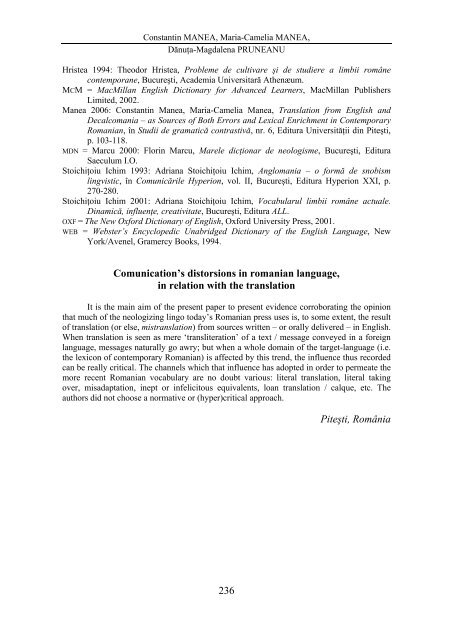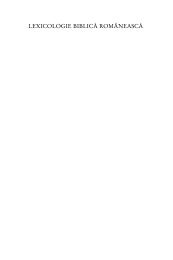Distorsiuni ale comunicării în limba română legate de ... - A. Philippide
Distorsiuni ale comunicării în limba română legate de ... - A. Philippide
Distorsiuni ale comunicării în limba română legate de ... - A. Philippide
You also want an ePaper? Increase the reach of your titles
YUMPU automatically turns print PDFs into web optimized ePapers that Google loves.
Constantin MANEA, Maria-Camelia MANEA,<br />
Dănuţa-Magd<strong>ale</strong>na PRUNEANU<br />
Hristea 1994: Theodor Hristea, Probleme <strong>de</strong> cultivare şi <strong>de</strong> studiere a limbii române<br />
contemporane, Bucureşti, Aca<strong>de</strong>mia Universitară Athenæum.<br />
MCM = MacMillan English Dictionary for Advanced Learners, MacMillan Publishers<br />
Limited, 2002.<br />
Manea 2006: Constantin Manea, Maria-Camelia Manea, Translation from English and<br />
Decalcomania – as Sources of Both Errors and Lexical Enrichment in Contemporary<br />
Romanian, <strong>în</strong> Studii <strong>de</strong> gramatică contrastivă, nr. 6, Editura Universităţii din Piteşti,<br />
p. 103-118.<br />
MDN = Marcu 2000: Florin Marcu, Marele dicţionar <strong>de</strong> neologisme, Bucureşti, Editura<br />
Saeculum I.O.<br />
Stoichiţoiu Ichim 1993: Adriana Stoichiţoiu Ichim, Anglomania – o formă <strong>de</strong> snobism<br />
lingvistic, <strong>în</strong> Comunicările Hyperion, vol. II, Bucureşti, Editura Hyperion XXI, p.<br />
270-280.<br />
Stoichiţoiu Ichim 2001: Adriana Stoichiţoiu Ichim, Vocabularul limbii române actu<strong>ale</strong>.<br />
Dinamică, influenţe, creativitate, Bucureşti, Editura ALL.<br />
OXF = The New Oxford Dictionary of English, Oxford University Press, 2001.<br />
WEB = Webster’s Encyclopedic Unabridged Dictionary of the English Language, New<br />
York/Avenel, Gramercy Books, 1994.<br />
Comunication’s distorsions in romanian language,<br />
in relation with the translation<br />
It is the main aim of the present paper to present evi<strong>de</strong>nce corroborating the opinion<br />
that much of the neologizing lingo today’s Romanian press uses is, to some extent, the result<br />
of translation (or else, mistranslation) from sources written – or orally <strong>de</strong>livered – in English.<br />
When translation is seen as mere ‘transliteration’ of a text / message conveyed in a foreign<br />
language, messages naturally go awry; but when a whole domain of the target-language (i.e.<br />
the lexicon of contemporary Romanian) is affected by this trend, the influence thus recor<strong>de</strong>d<br />
can be really critical. The channels which that influence has adopted in or<strong>de</strong>r to permeate the<br />
more recent Romanian vocabulary are no doubt various: literal translation, literal taking<br />
over, misadaptation, inept or infelicitous equiv<strong>ale</strong>nts, loan translation / calque, etc. The<br />
authors did not choose a normative or (hyper)critical approach.<br />
236<br />
Piteşti, România



